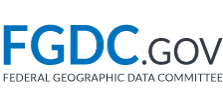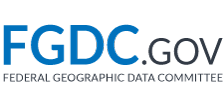Action items.
Action 1: Please contact Alison Kiernan Dishman (adishman@fgdc.gov) if you can host the June 8 Coordination Group meeting.
Host: Shane Dettman, NCPC
Attendees:
Ivan DeLoatch, FGDC Staff Director
Anne Frondorf, USGS
Richard Pearsall, USGS
Rob Dollison, FGDC/GOS
Bonnie Gallahan, FGDC/GOS
Julie Maitra, FGDC
Anne O'Connor, Census
Michael Domaratz, USGS
John Clark, GSA
Brett Abrams, NARA
Richard Moore, FGDC/GOS
Monica DeAngelo, FERC
Bruce Mckenzie, FGDC
Matthew Shepard, BTS
Donna Scholtz, FGDC/GOS
Mark Wahlfield, BTS
Sal Sclafani, HUD
Trica Gibbons, LEAD
Jochen Albrecht, UCGIS
Betsy Kanalley, USFS
Leslie Wollack, FGDC/GOS
Kim Owens, NOAA
Ed McKay, NOAA/NGS
Doug Graham, NOAA/NGS
Eric Linzey, NOAA
Milo Robinson, FGDC
Billy Tolar, USGS/Nat.Atlas
Myra Bambacus, NASA
Brad Beach, NGA
Lee R. Warren, NGA
Tim Trainor, Census
David Morehouse, DOE
Susan Hargrove, DOE
Michael Sherman, NCPC
Scott McAfee, DHS/FEMA
Chuck Croner, CDC
Shane Dettman, NCPC
David Painter, FGDC
Drew Douglas, DHS
Barb White, FWS
Sharon Mesick, NOAA
Stephanie Foster, CDC
David Stein, NOAA
All presentations and documents will posted at the FGDC website.
Homeland Security Working Group Update - Michael Domaratz, USGS
Mike Domaratz, Co-Chair of the FGDC Homeland Security Working Group described the Guidelines for Identifying and Restricting Geospatial Data That Have Significant Potential Value to Adversaries of the United States developed by the working group. The presentation outlined concerns of public access to geospatial data that may increase vulnerability to attack, how to determine the sensitivity of data, different approaches to sensitivity, and the cost of information restriction.
The guidelines' purpose is to identify sensitive data and provide appropriate restrictions; a balance between restrictiveness and access. The guidelines outline a series of decisions on the part of the originating organization in determination of sensitivity and the appropriate restriction. The guidelines do not address internal organizational requirements, data derived from combinations of data, the enforcement of restrictions on downstream users or appeal processes.
Responses to questions include:
- Guidelines will utilize those metadata fields that already exist
- Data security best practices need to cover metadata issues as well as to deal with different agency viewpoints since there is no adjudication process. These practices could be developed under the auspices of the HS working group.
Announcement for the public review of the guidelines will appear in the Federal Register.
For additional information see http://www.fgdc.gov/fgdc/homeland/index.html.
NSDI Future Directions Activity - Tricia Gibbons, LEAD
Tricia Gibbons provided an update on the Future Directions Initiative to define the future efforts to further the NSDI. She reviewed the "Consistent Messages," so far identified, the "Bold Steps," and the timeline.
Tricia conducted a brainstorming exercise with the coordination group to identify 3 or 4 national goals to be achieved by 2007 and a means to measure their accomplishment. Results of this session will be provided separately. Tricia will brief the Coordination Group at its April 6 meeting.
See the Future Directions website for additional information: www.fgdc.gov/FutureDirections
[PowerPoint 134KB]
Geospatial One-stop Update - Donna Scholtz/Richard Moore, GOS
[PowerPoint 1MB]
An update on the status of GOS was presented. The draft framework standards are being prepared for ANSI and FGDC public review expected this spring. A new "Status Page" has been implemented on the Portal (click on Information Center, >Data Standards,>Usage Statistics). Display includes current graphic selections and channel activity.
Inventory of existing data (module 2); The process will populate GOS from existing clearinghouse nodes. The automated harvesting tool to do this is being tested. Metadata for planned data will be harvested along with metadata for existing data sets. A harvesting counselor will be contacting agencies to assist in implementation.
Planned acquisition marketplace (module 3); How to register to publish on GOS, the partnership opportunities function, and the GOS searchable metadata elements were described.
GOS participants are encouraged to continue metadata publishing of existing and planned data in their metadata repositories for harvesting. These repositories are harvestable as a Z39.50 clearinghouse, ArcIMS, Open Archives Initiative (OAI) format and XML web directory.
GOS Module 2 & 3 Contacts: Sharon Shin, 303.202.4230, sharon_shin@fgdc.gov; Richard Moore, 703.648.4561, rfmoore@usgs.gov.
Data channels (module 4); The data theme channel concept has been developed, and stewards selected. Channel functionality and management tools draft requirements and templates under development to be completed mid-March. These requirements will be implemented 30-days after review and approval by channel stewards.
GOS Portal Version 2 (module 5); Version 1 of the GOS portal was implemented quickly as an operational prototype so that we could provide functionality and develop "lessons learned" for the operational portal design. Currently, functional requirements for version 2 of the GOS Portal are being identified. These requirements will be released for a 30-day public review. RFP for development is targeted for June 2004.
There is a question whether planned acquisition reporting by agencies can be included in module 3 without additional OMB reporting. From discussions there was a recommendation that FGDC should work with OMB to address reporting issues and look at alternatives to OMB 300 process.
See www.geo-one-stop.gov for more information.
GSDI Activities - Al Stevens, International Activities Coordinator
[PowerPoint 383KB]
Al Stevens presented an update on Global Spatial Data Infrastructure (GSDI) activities and accomplishments. The GSDI is a natural follow-on to the FGDC and for an interim time-period, FGDC is sponsoring the GSDI Secretariat. The general goals of the FGDC including promoting the use of common standards and interoperable systems and processes when we collect, process, archive and share geospatial data, and the GSDI are the same with GSDI having a global perspective. The GSDI started in 1996 and has had 7 successful meetings in different parts of the world garnering 250 - 400 attendees and about 50-52 nations. The GSDI now has formal nonprofit status to facilitate its expansion and influence, and to broaden its mechanisms that encourage data sharing. In addition, accomplishments include support for numerous training sessions and the publication of the Spatial Data Infrastructure Cookbook. The GSDI 8 Conference will be held April 16-25, 2005 in Cairo, Egypt. For more information visit www.gsdi.org.
Random Access Metadata tool for Online National Assessment (RAMONA) - Bill Burgess, NSGIC
RAMONA will be designed as a web-based tool with dynamic functionality, such as automatic metadata generation, status maps, reporting functions and "Rolodex(r)-like" applications. It will address the common information elements based on stakeholder needs, including status of GIS programs, platforms, connectivity, policy issues, data, and issues assessment. The product will be made available to all national interests and NSGIC State Coordinators will implement its use through local coordination efforts. RAMONA will complement GOS with an overlap of activities. See http://directionsmag.com/article.php?article_id=517 for additional information.
The FGDC Steering Committee is planned for June, date to be determined.
Next Coordination Group Meeting:
April 6, 2004
9 a.m. - noon
Location: NACo
440 First Street NW
Washington, DC 20001
Metro: Judiciary Square or Union Station (both are on the red line and both are equidistant from NACo)
Contact: Kevin Neimond, 202.942.4247
Please note: May 4 meeting will be hosted by GSA. The June 8 Coordination Group meeting is being held on the second Tuesday of the month, due to the Memorial Day holiday. A volunteer is needed to host the June 8 Coordination Group meeting from 9 am - noon. Please contact Alison Dishman (adishman@usgs.gov) if you would like to host the June 8 Coordination Group meeting.

